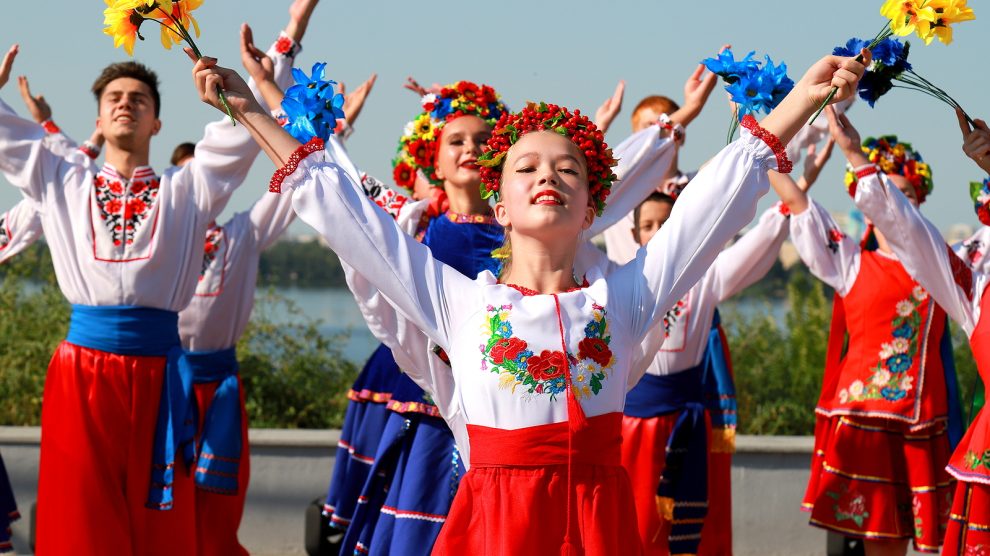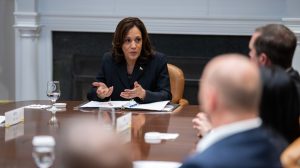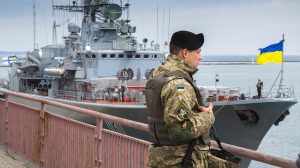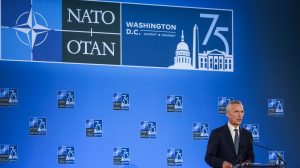Catch up quickly with the stories from Central and Eastern Europe that matter.
Russia’s war on Ukraine
Ukraine on Thursday marked its second Independence Day since Russia’s full-scale invasion, with officials vowing to keep up their fight to drive out the Kremlin’s forces and local people remembering their fallen loved ones.
The national holiday coincided with the war’s 18-month milestone, giving a somber mood to the commemorations.
“We remember everyone who gave their lives for freedom and independence, for the free future of Ukraine,” Ukraine President Volodymyr Zelensky said in a social media post.
He said that an independent Ukraine is “what we are fighting for.”
An aircraft said to be carrying notorious warlord Yevgeny Prigozhin, whose Wagner group launched a failed mutiny in June, crashed on a flight from Moscow to St Petersburg on Wednesday.
All 10 people on the plane, including three crew members, died in the crash, Russia’s emergency ministry said. Russia’s aviation agency published a list of names of people aboard the jet, including Prigozhin and his right-hand man, Dmitry Utkin.
A social media page linked to the Wagner group also reported Prigozhin’s death late on Wednesday evening.
On Thursday, Zelensky said that Ukraine had nothing to do with the crash.
“Everyone is aware who is involved,” he told journalists.
Denmark has begun training eight Ukrainian pilots in flying F-16 fighter jets as part of its commitment to donate aircraft to the country.
This comes after Denmark and the Netherlands pledged on Sunday to donate up to 61 F-16s to Ukraine. The eight pilots have arrived at the Danish military airbase in Skrydstrup along with 65 personnel who will be trained in maintaining and servicing the jets.
F-16s will not be transferred until pilots and ground crews are properly trained. The process will take six months for learning the pilot skills, plus about another four months for the pilot crews to learn technical English to the required standard, so the jets are not expected to fly combat missions until 2024.
Romanian Prime Minister Marcel Ciolacu said roughly 60 per cent of Ukraine’s grain exports could transit through neighbouring Romania after Russia quit a United Nations-brokered safe passage deal through the Black Sea.
Ukraine is one of the world’s top grain exporters and Russia has been attacking its agricultural and port infrastructure after refusing to extend the year-old safe passage corridor. Even before the deal fell through, Romania’s Black Sea port of Constanta had emerged as Ukraine’s biggest alternative shipping route, and Ciolacu said Bucharest is trying to improve its connecting infrastructure by rail, road, river and sea, as well as at border crossings.
Russian President Vladimir Putin, wanted under international arrest warrant for alleged war crimes in Ukraine, said in a video address to the BRICS summit in South Africa that Russia would remain a “responsible supplier” of food and grain to African countries and could take Ukraine’s place as an international supplier of grain.
Eurostat figures published this month show that the number of Ukrainian refugees in Poland fell to 977,740 in June, down from 991,375 in May and from 1.02 million last October.
Meanwhile, the figure in Germany rose from 873,860 to 1.13 million between October and June, and in the EU as a whole from 3.76 million to 4.07 million. In July, the number of refugees in Poland fell even further, to 971,080.
Poland’s Union of Entrepreneurs and Employers (ZPP) raised concern at the trends being shown in the figures. “The Polish economy urgently needs migrants who want to work, study and live in our country,” wrote the ZPP, noting that, in the aftermath of Russia’s invasion, refugees from Ukraine filled “thousands of vacancies” in Poland.

Other news from the region
Azerbaijan has reportedly allowed several dozen residents of Armenian-populated Nagorno-Karabakh to go to Armenia after having tightly blockaded the region for over two months. The development has led to speculation about possible agreements between Karabakhi and Azerbaijani officials. On Monday, Azerbaijani public television reported the movement of “up to 60 Armenian residents of Nagorno-Karabakh with Russian passports” to Armenia via the Azerbaijani customs checkpoint at the Lachin road – which is the only road connecting the region to Armenia and the outside world.
Poland plans to raise spending on defence, health, social benefits and public sector pay in 2024, the prime minister said on Thursday, after the government approved the budget for next year with an eye on elections scheduled for October 15. Poland’s ruling nationalist Law and Justice (PiS) party, which has already won two elections in part thanks to generous social benefit programmes, has put security at the core of its campaign this year amid fears of rising instability on the country’s eastern border with Belarus.
Latvian President Edgars Rinkēvičs on Thursday tasked Evika Siliņa of the centre-right New Unity party with forming the next government following the resignation of Prime Minister Krišjānis Kariņš. Siliņa, a former lawyer who was welfare minister in the outgoing government, still needs to win a confidence vote in a fractured parliament, where her party commands 26 votes. Kariņš, also of New Unity, the largest in the 100-seat parliament, announced his resignation on August 14, blaming a breakdown in relations with parts of his multi-party coalition.
Belarusian authorities on Wednesday declared the country’s oldest and most prominent human rights group an extremist organisation. The move against Viasna, founded by imprisoned Nobel Peace Prize laureate Ales Bialiatski, comes amid a yearslong crackdown on dissent in Belarus and exposes anyone involved in its activities to criminal prosecution. Belarus’ Interior Ministry on Wednesday accused Viasna of “preparing attacks on the sovereignty and public security of Belarus, (and) discrediting and insulting officials.”
Albania’s prime minister, Edi Rama, on Tuesday responded to not being invited by Greece to a dinner for top officials from nine Balkan nations and the European Union by saying that in “such turbulent times” Europe’s unity is “larger than what divides us”. Rama was not invited in a protest over his country’s jailing of ethnic Greek minority leader Fredi Beleri, who was arrested before a mayoral election in May on vote-buying allegations.
Albania, along with Montenegro and North Macedonia, also this week expressed concern after Serbian defence minister Miloš Vučević, who is also head of the ruling Serbian Progressive party, said that their recognition of Kosovo will come back to hurt them. Vučević also complained that ethnic Serbs in Montenegro are underrepresented as ministry heads and claimed Tirana is seeking to create a ‘Greater Albania’ in the region. Leaders from the three NATO allies called the comments “dangerous and unacceptable”.
Former prime minister Robert Fico and his populist Smer party alleged without evidence this week that a “police coup” will steal Slovakia’s September election from him. The assertion comes after a former police chief from the era of Smer governments who is now standing as a parliamentary candidate for Smer was detained and charged with corruption. The extremist Republika, Hlas, and Slovak National (SNS) parties have also adopted narratives of election rigging, promising parallel vote counting to prevent any irregularities.
The Moldovan Interior Ministry on Monday cited a ban on musician Goran Bregović imposed last year because of his pro-Russian views as the reason he and his band were not allowed to enter Moldova over the weekend. The Interior Ministry issued its explanation after musician and his band were prevented from attending a festival in the town of Orheiul Vechi, where they were scheduled to perform on Sunday. Seven hours before the concert, festival organisers announced on Facebook that Bregovic and his band would not perform “for reasons beyond the control of festival organisers or artists.”
Unlike many news and information platforms, Emerging Europe is free to read, and always will be. There is no paywall here. We are independent, not affiliated with nor representing any political party or business organisation. We want the very best for emerging Europe, nothing more, nothing less. Your support will help us continue to spread the word about this amazing region.
You can contribute here. Thank you.







Add Comment